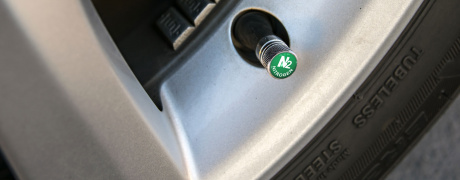
Maintaining a proper tire inflation pressure is among the most basic methods of increasing the vehicle’s fuel economy. When you have the correct tire pressure and balanced load capacity, it can be helpful in enhancing the longevity of the tire tread. Although having a good quality tire is vital, but it is its internal pressure that has to do all the lifting.
If you don't like to check your vehicle's tire pressure, then nitrogen tire inflation can be your best choice, as it is a stable gas capable of maintaining air pressure at any temperature. As the expansion and contraction of the gases in your tires depend on the ambient temperature, so nitrogen tire inflation can indeed be helpful.
What is Nitrogen Tire Inflation?
The rubber used to make tires consists of a molecular structure, and its expansion and contraction depend on the internal pressure and ambient temperature, as the air can escape through the permeable membrane.
Nitrogen comes with a more robust molecular structure and is able to maintain constant pressure by keeping the molecules inside the tire.
As nitrogen is a dry and inert gas, unlike the refillable air found in most gas stations, it can minimize oxidation, reduce wear, and limit humidity and heat-trapping moisture. Therefore, it can be a great way to prolong the life of the tires.
The Process of Nitrogen Inflation
With the help of the nitrogen inflation process, you can have the highest nitrogen percentage in each tire. 96 percent is known to be optimal, but the main idea is to reduce the amount of oxygen and other common gases.
The process starts by opening the valve port of the tire, and all the air is removed. In the next step, a nozzle is attached to the source of nitrogen, and then the tire is inflated to the recommended pressure.
Once the required PSI is reached, the valve port is again opened to allow almost all of the nitrogen to go out. This valve is then closed just before all of the nitrogen gets evacuated. In the end, the tire is filled to the recommended PSI of the tire manufacturer.
What Are the Benefits of Nitrogen Tire Inflation?
The primary benefit is the reduced speed of air pressure loss.
With nitrogen, you can prevent moisture from accelerating any deterioration of the equipment and the rubber compounds.
It can also be helpful in slowing down the oxidation of steel belts.
When the tires are inflated with nitrogen, they prevent rusting of the wheel rims.
Final Verdict
Whether you go for nitrogen tire inflation or regular air, it is essential that you keep the tires inflated in a proper manner because it helps to reduce the rolling resistance and improves the fuel efficiency of the vehicle.
As a driver, inflating the tires with nitrogen may not hurt you and can indeed provide you with a number of benefits, but availability and cost is the main barrier for the vehicle owners for making the transition to nitrogen.
Same articles

Understanding Vehicle Inspection and Verification Services: Why They Matter for Every Driver
GuidesVehicle inspection and verification services are an essential but often overlooked part of keeping roads safe and cars legally compliant. Most people only think about inspections when it’s...
KLIFEX Brand Overview: High-Quality Automotive Repair Kits for Affordable Repairs
GuidesThe automotive aftermarket has long needed solutions that combine reliability, durability, and affordability. Many car enthusiasts and services are looking for a way...
Fast, Reliable Vehicle Emissions & Inspection Services Made Simple
GuidesFast, reliable emissions and inspection services are essential for keeping vehicles road-ready, compliant with environmental regulations, and safe for daily driving. If you’re looking for quick...

